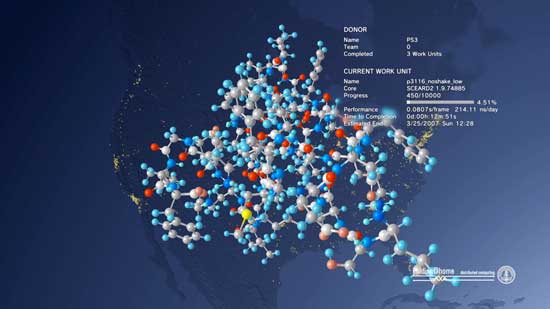Apparently, the cell processor is good for something other than making Ratchet’s tail all furry and stuff. Sony Computer Entertainment has issued a press release informing us that Stanford University’s Folding@home program has been recognized by Guinness World Records as the world’s most powerful distributed computing network … because of the PlayStation 3.
More than 670,000 unique PS3 users are said to have registered to the Folding@home network, allowing the network to surpass one petaflop on September 16, 2007. On September 23, 2007, PS3 users have hit that one petaflop mark on their own. While Folding@home is available for use on other platforms, Vijay Pande, Associate Professor of Chemistry at Stanford University and Folding@home project lead praises the power of Sony’s console.
“None of this would be even remotely possible without the power of the PS3,” he says. “It has increased our research capabilities by leaps and bounds.”
Congratulations PS3 owners, you’re doing some good in the world. Now who’s paying your electric bill again?
PLAYSTATION®3 ENABLES FOLDING@HOME™ TO BE RECOGNIZED BY GUINNESS WORLD RECORDS™ AS WORLD’S MOST POWERFUL DISTRIBUTED COMPUTING NETWORK
Tokyo, November 1, 2007 – Sony Computer Entertainment Inc. (SCEI) today announced that PLAYSTATION®3 (PS3®) computer entertainment systems, part of Stanford University’s
Folding@home™ program, have enabled the distributed computing project to be recognized by Guinness World Records™ as the most powerful distributed computing network in the world. The record was initially set on September 16, 2007 as Folding@home surpassed one petaflop(*1), a computing milestone that has never been reached before by a distributed computing network. In addition to this, the collective efforts of our users have enabled PS3 alone to reach the petaflop mark on September 23, 2007.
The record is a testament to the widespread participation of PS3 users from around the world—currently more than 670,000 unique PS3 users have registered to the Folding@home network, bringing the overall computing power of the program to more than a petaflop. Thanks to PS3’s powerful Cell Broadband Engine™ (Cell/B.E.), scientists will now be able to make greater progress in their studies of protein folding and its link to diseases such as Alzheimer’s, Parkinson’s and certain forms of cancer.
“To have Folding@home recognized by Guinness World Records as the most powerful distributed computing network ever is a reflection of the extraordinary worldwide participation by gamers and consumers around the world and for that we are very grateful,” said Vijay Pande, Associate Professor of Chemistry at Stanford University and Folding@home project lead. “Without them we would not be able to make the advancements we have made in our studies of several different diseases. But it is clear that none of this would be even remotely possible without the power of PS3, it has increased our research capabilities by leaps and bounds.”
“To have PS3 play such a large role in allowing Folding@home to be honored by Guinness World Records is truly incredible,” said Masayuki Chatani, Executive Vice President & Chief Technology Officer, Technology Platform, Sony Computer Entertainment Inc. “This record is clear evidence of the power of PS3 and the contributions that it is making to the Folding@home network, and more importantly, scientific research.”
The Folding@home program up until recently leveraged only the distributed computing power of personal computers (PC) from around the world. The PCs that made up the Folding@home network numbered roughly 200,000 giving the program the equivalent of about one-quarter of a petaflop. On March 15, 2007, PS3 joined the program and since then more than 670,000 unique PS3 users have registered to the Folding@home network, bringing the overall computing power of the program to more than a petaflop. Starting with Folding@home, SCE will continue to support distributed computing projects in a wide variety of academic fields such as medical and social sciences and environmental studies through the use of PS3 and hopes to contribute to the advancement of science.




